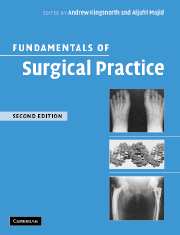Book contents
- Frontmatter
- Contents
- Preface
- Contributors
- 1 Preoperative management
- 2 Principles of anaesthesia
- 3 Postoperative management
- 4 Nutritional support
- 5 Surgical sepsis: prevention and therapy
- 6 Surgical techniques and technology
- 7 Trauma: general principles of management
- 8 Intensive care
- 9 Principles of cancer management
- 10 Ethics, legal aspects and assessment of effectiveness
- 11 Haemopoietic and lymphoreticular systems: anatomy, physiology and pathology
- 12 Upper gastrointestinal surgery
- 13 Lower gastrointestinal surgery
- 14 Hernia management
- 15 Vascular surgery
- 16 Endocrine surgery
- 17 The breast
- 18 Thoracic surgery
- 19 Genitourinary system
- 20 Head and neck
- 21 The central nervous system
- 22 Musculoskeletal system
- 23 Paediatric surgery
- Index
23 - Paediatric surgery
Published online by Cambridge University Press: 15 December 2009
- Frontmatter
- Contents
- Preface
- Contributors
- 1 Preoperative management
- 2 Principles of anaesthesia
- 3 Postoperative management
- 4 Nutritional support
- 5 Surgical sepsis: prevention and therapy
- 6 Surgical techniques and technology
- 7 Trauma: general principles of management
- 8 Intensive care
- 9 Principles of cancer management
- 10 Ethics, legal aspects and assessment of effectiveness
- 11 Haemopoietic and lymphoreticular systems: anatomy, physiology and pathology
- 12 Upper gastrointestinal surgery
- 13 Lower gastrointestinal surgery
- 14 Hernia management
- 15 Vascular surgery
- 16 Endocrine surgery
- 17 The breast
- 18 Thoracic surgery
- 19 Genitourinary system
- 20 Head and neck
- 21 The central nervous system
- 22 Musculoskeletal system
- 23 Paediatric surgery
- Index
Summary
The specialty of paediatric surgery has developed in recognition of the facts that infants and children differ from adults in their anatomy, physiology and psychology as well as in the diseases they encounter. It is a broad specialty and is defined by age rather than by organ systems. There are two levels of specialization: specialist paediatric surgery and general paediatric surgery.
Specialist paediatric surgery consists of:
Neonatal surgery from birth to postconceptional age of 44 weeks;
Surgery of major or complex conditions in infants and older children, including neoplasms, hepatobiliary diseases, specialized gastrointestinal conditions, thoracic anomalies, major trauma, etc.;
Paediatric urology.
General paediatric surgery encompasses relatively common and less demanding disorders, including elective conditions such as inguinal hernia and emergency conditions such as appendicitis in older children.
The outcome of infants and children requiring surgery has improved enormously in recent years as a result of a better understanding of physiology of children, improvement of surgical techniques, advances in paediatric anaesthesia and intensive care and the adoption of a multidisciplinary approach. Attention to the psychological needs of children, involvement of the family in the management process and more effective postoperative pain relief further enhance the quality of care for these children.
SURGICAL PHYSIOLOGY
Children are not ‘small adults’. The differences between children and adults are greatest immediately after birth as the infant adapts to extrauterine life: these are further accentuated in preterm babies.
- Type
- Chapter
- Information
- Fundamentals of Surgical Practice , pp. 493 - 524Publisher: Cambridge University PressPrint publication year: 2006
- 1
- Cited by

